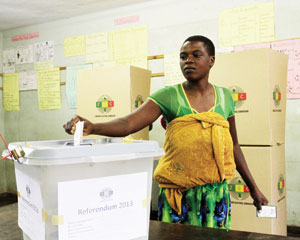
The coming election on July 31 2013 is the swan song for the Global Political Agreement (GPA) and its offspring, the Government of National Unity (GNU). REPORT BY ALOIS T MASEPE
The main platform of the GPA and the agenda of the GNU were to ensure that Zimbabwe had in place a firm foundation for the establishment of a truly democratic society. The transformation process required a new constitution, institutional reform and mind-set/attitudinal paradigm shift in respect of some key organs of state such as the security sector, Judiciary, election administration and government-controlled media.
We had to undergo the above process as a way of exorcising the ghost of the June 2008 presidential election run-off when the beast in man was allowed to walk naked and take centre-stage. The primitive savagery that was unleashed on innocent people in the period preceding the election day (June 27 2008) left the people shell-shocked and traumatised. The madness subsequently attracted the intervention of Sadc and the African Union.
Now that we have come to the GPA and GNU endgame — the question is: Are the elections going to be free and fair (feya-feya) or are we involved in a wapusa wapusa and feja-feja [manipulation of figures] game?
For the uninitiated, feja-feja is a money game of the underworld in which a victim is lured into playing on promises of winning easily. In the initial stages of the game, the victim actually wins big and easily as a confidence boosting ruse. Once the victim warms up and is sufficiently massaged to fully partake, the game also changes into wapusa wapusa [blink-and-you-lose] mode. The victim is not allowed to quit the game until the conmen are satisfied that they have indeed creamed off and cleaned out their prey.
The fairness and fair nature of an election is not determined by the casting of ballots. It is fallacious and misleading to argue that the act of casting a vote equals democracy. Democracy is much more than the ritual act of casting the ballot paper. In order to judge an election, one must look at the totality of the election process and the mind-set of those mandated to manage the actual election.
The key questions are: Do we have national consensus on the issue of establishing a multi-party democracy in Zimbabwe and, have the political gladiators agreed to embrace and be guided by democratic principles and norms in their endeavour and efforts to seek power?
Do we accept and embrace as sacrosanct the principle and belief that all legitimate and sovereign power comes from the people and that the manifested will of the people is also the wish of God?
- Chamisa under fire over US$120K donation
- Mavhunga puts DeMbare into Chibuku quarterfinals
- Pension funds bet on Cabora Bassa oilfields
- Councils defy govt fire tender directive
Keep Reading
Do we in this country have in place support structures that insist upon, encourage and reinforce the establishment of a truly multi-party democracy and institutions and organs that guarantee, uphold and defend the will of the people?
Are we agreed that the practice of holding elections that are seen to be free and fair is the only guarantee for nation peace, security and development.
If the answer to the above questions is in the affirmative, then we would be proud of the result on July 31.
We have a new constitution — albeit being work in progress — that captures the ideals and principles of a democratic society. However, it is undeniable that going into the coming elections, the new constitution has been effectively frozen, thanks to Presidential Powers Act.
The attitude, demeanour and conduct of the security sector are hostile and threatening.
The government-controlled media and other keys organs of the electoral process (which were created to serve the purpose of a one party anachronism) refuse to undergo political paradigm shift.
Given the above indications and observations, the country is clearly not in a position to hold free and fair election.
The real problem is that the country is in the midst of a transition arising from a clash of the old and new order. The election is therefore an unfair contest between a well-entrenched, omnipresent and combative old order and a popular new order movement struggling to find its roots and space.
A free and fair election is a product of a political environment and mind-set that effectively empowers the people to express their political freedoms of expression, choice and association. This situation demands that the political leadership must been seen affording the people the opportunity and space to exercise their free will in electing a political leadership of their choice.











